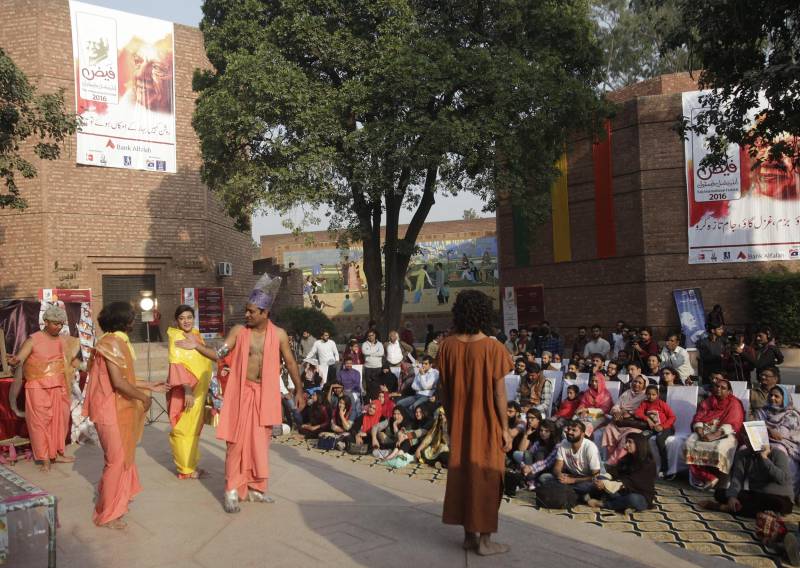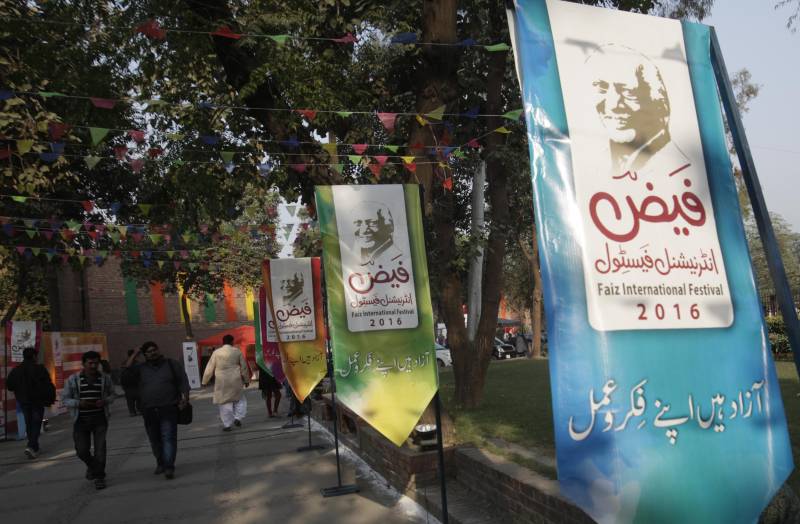LAHORE: The second Faiz International Festival that opened on November 19 rolled on in earnest yesterday at Alhamra Halls in the Lahore Arts Council on The Mall.
The festival featured panel discussions, music and theatre performances, book launches, lectures, poetry and theatrical readings, photographic and art exhibitions, visual art and story writing competitions, workshops on dance, theatre and filmmaking and many more activities.
The festival gave the look of carnival as many people from across the city as well as other towns and cities turned up in good numbers to pay tribute to the legendary poet and thinker Faiz Ahmed Faiz. A food court had also been set up for the convenience of visitors. A number of personalities related to arts and above mentioned fields have come from other countries to share their views on contemporary situation.
On Saturday there were two book launch events. The first was ‘Over my shoulder & dear heart’ by Alys Faiz. The panelists in this session were Maheen Pracha and IA Rehman. It was conducted by Khaled Ahmed. The second was launch of ‘Faiz ki shairi may Punjab rang (The colours of Punjab in poetry of Faiz). In this launch Dr Asghar Ali Baloch was in conversation with Dr Saeed Ahmad. There was a session in memory of Ahmad Nadeem Qasmi that was moderated by Asghar Nadeem Syed. The panelists were Masood Ashar, Naheed Qasmi and Amjad Islam Amjad. Dr Tariq Hashmi moderated a session titled ‘Faiz and classical poetry’. The panelists in this session were Dr Ziaul Hasan, Dr M Afzal Hameed and Dr Imran Zafar. Besides these were sessions on ‘Influence of Faiz’s verse on other Pakistani languages’, ‘Discovering Pakistan the hard way,’ ‘Women of Pakistan’ and ‘Writing Faiz.’ In the evening there was classical orchestral performance by Tarz Group, which was followed by mesmerizing performances by Ustad Hamid Ali Khan and Tina Sani. Following are excerpts of the proceedings of two important sessions:
Without addressing the fault lines in our society and continuing double standard policy our country would not achieve real democracy to which deep roots of feudalism poses serious threats since inception of Pakistan.
This was stated in session titled ‘The Battle of Ideas in Pakistan’ by speaker Dr Syed Jaffar Ahmed who presented a paper on progressive writer Sibte Hassan. The session was moderated by Tahir Kamran.
Dr Jaffar said literary and ideological discourse had been openly discussed at the time of undivided India when different political, literary and ideological groups participated in politics. He said Sibte Hassan in 1936 founded Anjuman Tarraqi Pasand Mussanafin-e-Hind or Progressive Writers' Movement and subsequently the Indian youth lured towards the small faction of intellectuals and made it to larger platform to express their ideologies. “As a result of coming up of many people, it paved the way towards production of creative writing and more prominent poets and writers became part of the PWM.
“Sibte Hassan was progressive and open minded, he started raising questions and commenting at time when no one was ready to talk on taboo issues and it encouraged writers include Saadat Hassan Manto who wrote courageously on horrors of partition of India,” he said.
Dr Jaffar maintained that Sibt-e-Hassan had read Marxism and was ardent follower of Communist Party of Pakistan until it was banned in 1954. He was of the view that Lail-o-Nihar was the magazine through which Sib-e-Hassan flourished many intellectuals’ minds to write and comment on the political issues and to challenge the traditions.
“He had not read Marx, Engels and Lenin’s philosophy as dogma and faith instead he was convinced that Marxism could only be brought in society only if it understood its true spirit in the local perspective,” he said.
“When he was prison at Lahore Fort he thought of writing masterpiece ‘Mazi kay Mizaar’, and that book encouraged countless further intellectuals to think differently from the set narrative,” Dr Jaffer said.
“Pakistan Mein Tehzeeb ka Irtiqa’ book was also valuable contribution of Sibte Hassan, in which he revolted against those who considered partition of Sub-continent was decided hundred years ago, proposition that was supported by Qudratullah Fatimi,’ Dr Jaffar was of the view.
Another book of Sibte Hassan was Naveed-e-Fikar. The book was written when third martial Law was imposed by General Ziaul Haq.
A number of ardent fans of Sibte Hassan were present in Hall 2 Alhamra. “Sibte Hassan wrote against imposition of punishments by Ziaul Haq.
“Our society has reached a point where girls school are being bombed by militants, veiled women are attacked, suicide bombing are taking place even on funerals. Sibte Hassan had pointed such anomalies. People are engaged in petty issues. Even the state is not ready to address the real issues and challenges,” Dr Jaffar concluded.
In session, ‘Local governments are pillars of democracy or hegemony of state’ PTI leader Asad Umar, Shaista Pervaiz Malik of PML-N, Awami Workers Party Asim Sajjad, and legal activist Salman Akaam Raja were panelists. Dr Ali Cheema moderated.
Asad said government was not in favour of transferring power and fiscal to the elected representatives of local government and they do this to secure their vested interests. Shaista was of the view that reason behind local government institutions were not empowered because of frequent stoppage of democratic governments by martial laws.
Asad said the elite group in Pakistan is not ready to invest in local governments and want to have power in their own hands. “Any MNA would not have that much clarity of issues in any constituency than a leader of Union Council and to reach Chairman of UC is far easier than becoming MPA or MNA. “The elected representatives of local government have no power as well authority to utilize the money, he questioned.
Salman said that article 140-a of Constitution of Pakistan narrates about the setting up of local governments but the law is silent on how this transition will happen. “Our government has set up many development agencies that local government has not even authority to pick up the litter of city. Decentralization of power is the real strength of local government,” he said.
Asim opined that the bitter reality was that these local governments were made only by dictators to undermine the political forces in their era.







